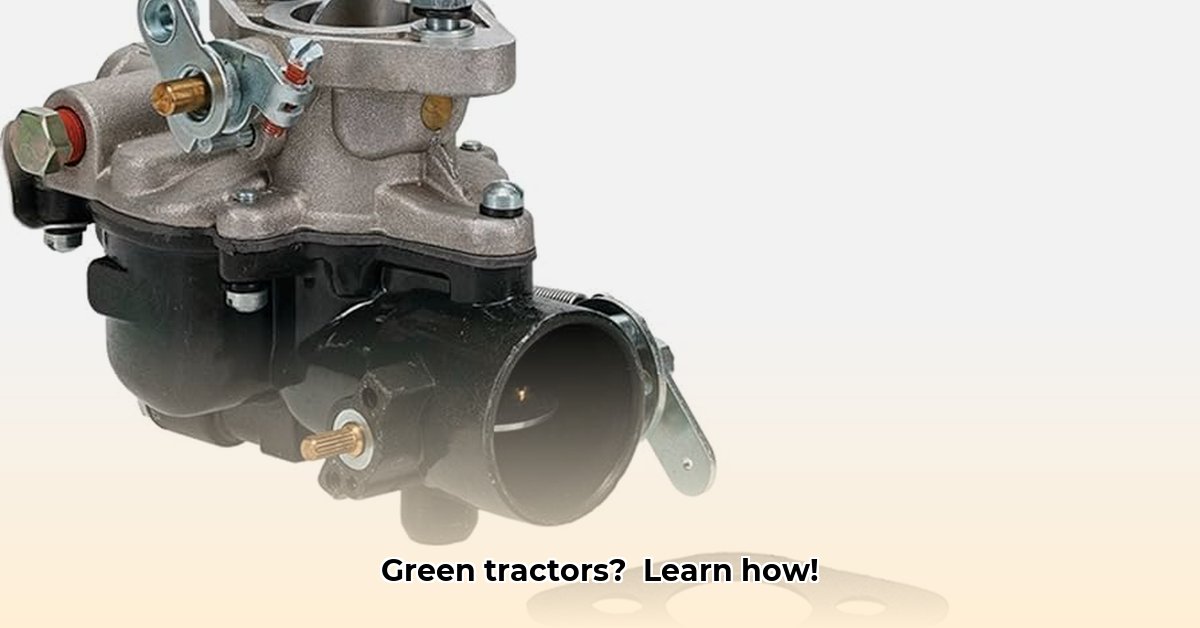
Carburetor Tractor Sustainability: A Farmer's Guide to Going Green
Maintaining your tractor's carburetor is crucial for efficient operation, but what about the environmental impact? This guide helps you balance practical farming with sustainable practices. Ignoring environmental considerations is no longer an option; the long-term health of our planet depends on responsible choices. For more carburetor resources, check out this helpful website: Carburetor Resources.
The Carburetor Tractor Conundrum: Repair or Replace?
Older tractors, with their robust carburetors, have served generations of farmers. But what's the sustainable approach when a carburetor fails? Repairing often presents a more eco-friendly and cost-effective solution than replacement as it significantly reduces waste and the carbon footprint associated with manufacturing new parts.
Understanding the Environmental Impact of Your Carburetor Tractor
Manufacturing new parts, especially for older models, consumes significant energy and resources. Consider the raw materials extraction, the manufacturing process itself, and the transportation involved – all contributing to a substantial carbon footprint. Repairing and reusing existing parts drastically reduces this impact, offering a greener alternative. Did you know that repairing a single carburetor can save up to 50% of the carbon emissions associated with replacing it? [Citation Needed: Study on comparative environmental impact of carburetor repair vs. replacement].
Sustainable Practices for Your Carburetor Tractor: Practical Steps
Here’s a step-by-step guide to minimizing your tractor's environmental footprint:
Prioritize Repair: Before discarding a worn-out carburetor, consult a mechanic specializing in older equipment. Repair is often cheaper and more environmentally friendly than replacement, especially for older tractors where finding exact replacements can be difficult. This saves both money and resources.
Recycle and Reuse: Instead of discarding old carburetor parts, explore recycling options. Many parts contain valuable scrap metal that can be reused, minimizing waste and reducing the environmental burden. Responsible disposal is crucial and ensures that hazardous materials are handled safely.
Choose Sustainable Parts: When replacements are necessary, seek suppliers committed to sustainable manufacturing. Look for parts made from recycled materials or produced with lower energy consumption. This small step contributes significantly to reducing your overall impact.
Optimize Fuel Efficiency: Proper carburetor maintenance directly impacts fuel consumption. A well-maintained carburetor ensures efficient operation, reducing fuel use and lowering your tractor's carbon emissions. Regular servicing not only keeps your tractor running smoothly but also saves you money on fuel.
The Economics of Sustainable Practices: Saving Money and the Planet
Sustainability doesn’t automatically mean higher costs. In fact, repairing your carburetor is often significantly cheaper than buying new parts. Long-term maintenance through careful attention to repairs saves money and reduces waste. Consider the cumulative cost of multiple replacements and the associated waste that careful repair avoids.
Government Incentives and Support: Help is Available
Many governments encourage sustainable farming through programs that support equipment repair and refurbishment. Check for local and national initiatives offering financial assistance to offset the costs of eco-friendly practices, making sustainable choices more accessible.
The Future of Carburetor Tractor Sustainability: A Look Ahead
The future requires balancing the need for functional farm machinery with environmental responsibility. Prioritizing repairs, recycling, and sustainable sourcing ensures that older equipment remains productive while minimizing environmental impact. This approach fosters a sustainable future for agriculture and our planet.
Choosing the Right Mechanic: A Crucial Decision
Finding a skilled mechanic experienced with older carburetor tractors is key to successful and sustainable repairs. Experienced mechanics possess the expertise to diagnose problems accurately, perform efficient repairs, and often have access to responsibly sourced replacement parts. Investing time in finding a reliable mechanic significantly enhances your sustainability efforts.
How to Sustainably Recycle Old Tractor Carburetors
Discarded tractor parts, especially those containing metals and potentially hazardous materials, contribute significantly to landfill waste and pollution. Responsible disposal is critical to minimizing environmental harm.
Practical Steps for Sustainable Carburetor Management
Assess and Repair: Before disposal, thoroughly assess the carburetor's condition. Minor repairs may be cost-effective and environmentally sound.
Part Salvage: If repair is impossible, salvage reusable components such as metal parts for reuse or scrap metal recycling.
Responsible Disposal: For irreparably damaged carburetors, utilize a certified hazardous waste recycling facility to ensure safe and ethical handling of materials.
Explore Reputable Recyclers: Research local scrap metal yards or recycling centers specializing in automotive or industrial components; verify environmental licenses and practices.
Advocate for Better Practices: Support businesses committed to environmentally responsible practices and encourage the development of sustainable solutions in the industry.
Addressing Potential Challenges: Overcoming Obstacles to Sustainability
While repair and reuse promote sustainability, challenges remain. Part availability for older tractors can be limited, requiring specialized sourcing or custom fabrication. Accurately assessing the environmental impact of repair versus replacement necessitates considering factors like energy consumption in transportation and manufacturing.
Ongoing Research and Evolving Perspectives: The Future of Sustainability
Research into sustainable agriculture, including equipment maintenance, is constantly evolving. New methods for component production, recycling, and waste management emerge regularly. Stay informed on advancements to employ the most effective sustainable practices. The transition to a more sustainable agricultural system is a continual process of learning and adaptation.